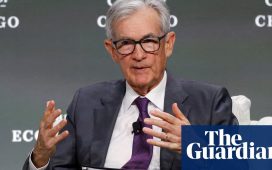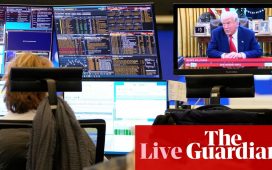Investors cut forecasts for interest rate cuts
Newflash: City investors are trimming their forecasts for how much the Bank of England will cut interest rates this year.
Following today’s smaller-than-expected drop in inflation in March, to 3.2%, the money markets are now only fully pricing in the first rate cut in November.
Before this morning, the first cut was expected by September.
UK RATE FUTURES POINT TO ABOUT 34 BASIS POINTS OF BANK OF ENGLAND RATE CUTS BY DECEMBER COMPARED WITH 42 ON TUESDAY
— First Squawk (@FirstSquawk) April 17, 2024
Reuters reports that UK rate futures pricing now predicts about 34 basis points of cuts to Bank rate this year, down from 42bp on Tuesday.
That suggests that one quarter-point cut to interest rates, to 5% from 5.25%, is widely expected, with only a moderate probability of another this year.
That’s clearly a blow to borrowers desperate for lower interest payments, and also to the government’s hopes for several cuts to interest rates before the next general election.
Key events
Closing post
Time to recap….
City investors and economists have been pushing back their forecasts for cuts to UK interest rates, after inflation fell by less than expected to 3.2% in March.
The money markets are now pricing in less than half a percentage point cut to the Bank of England’s base rate by December, implying that we may only get one cut to borrowing costs this year.
Currently, the first cut is priced in for September or November, with the possibility of a second by the end of the year.
Deutsche Bank pushed back their forecast for the first cut to June, from May, while BNP Paribas are now predicting August, not June.
There was some disappointment that inflation didn’t fall further, as the City had expected a drop to 3.1% per year in March. Food price inflation did slow, but motor fuel prices picked up in the month.
The government tried to take the credit for falling inflation, insisting that it “wasn’t an accident”, but did concede that prices are still going up:
‘Inflation is going down but prices are going up.’@edballs questions Chief Secretary to the Treasury Laura Trott on how inflation can be coming down but the cost of goods can be going up.
Laura Trott says the ‘rate of which prices are rising is coming down’. pic.twitter.com/hwXQVuCD2u
— Good Morning Britain (@GMB) April 17, 2024
Goods inflation slipped to just 0.8%, but service sector prices rose by 6% per year.
UK inflation is now lower than the US, but higher than in France and Germany.
Bank of England policymaker Megan Greene has warned that the recent tensions in the Middle East could pose a risk to the UK’s inflation outlook.
Here’s the full story:
And our analysis, explaining how the prospect that rates might not be cut until November is bad news for Rishi Sunak, if he hopes to call an election in the autumn.
In other news…
Driven by rental increases in England & Northern Ireland – avg rents crept up from 9.0% in Feb to 9.2% in the 12mths to March 2024. The highest annual percentage change since this UK @ONS data series began in Jan 2015.
£1,285 (9.1%) in England – ⬆️ from 8.8% in Feb 2024
£727… pic.twitter.com/j1v6EIkuhn— Emma Fildes (@emmafildes) April 17, 2024
And in other news:
Over in Washington, my colleague Larry Elliott has asked the IMF whether it thinks UK fiscal policy should be looser, or tighter.
Vítor Gaspar, director of the Fiscal Affairs Department at the IMF, resists giving Jeremy Hunt advice today – pointing out that the Fund will be in London next month, for a regular review of the UK.
But, he points out that the UK is characterised by relatively high debts. Growth has been low for a number of years, and “particularly lacklustre” in the recent past, Gaspar says. Yesterday’s World Economic Outlook trimmed the UK’s growth forecast for 2024 and 2025.
The UK, like other advanced economies, faces higher real interest rates and lower medium-term growth prospects, he continued.
Gaspar says the UK authorities are committed to fiscal consolidation and have been emphasising for years the need to reduce inflation and stabilise debt.
The key to bringing debt down to sustainable levels has three parts, he include.
-
taking into account the criticality of spending when assessing the importance and priority of public services,
-
making growth-enhancing investments
-
pushing through structural reforms to increase and improve potential growth.
Gaspar adds:
There are a variety of measures that UK authorities can take to improve the fiscal balance both on the spending and on the revenue side.
I would respectfully recommend that the forthcoming Article IV consultation in May will provide a opportunity to discuss this and other issues more in depth.
The IMF is also warning today that China and the US’s government debts could post a “significant risk” to the global economy.
In both economies, public debt is projected under current policies to nearly double by 2053, the Fund points out in its new Fiscal Monitor which hast just been published in Washington.
The IMF explains:
How these two economies manage their fiscal policies could therefore have profound effects on the global economy and pose significant risks for baseline fiscal projections in other economies.
The Fiscal Monitor says the US experienced “remarkably large fiscal slippages” last year, with the government deficit rising to 8.8% of GDP from 4.1% of GDP in 2022, despite strong growth.
US income tax revenues fell sharply, by 3.1 percentage points of GDP, owing to lower capital gains taxes in 2023 and delayed tax payment deadlines. Spending, in turn, increased by 1.3 percentage point of GDP.
The Fund estimates that the overall US fiscal deficit is projected to persist at more than 6% of GDP over the medium term.
The IMF also fears that economic and fiscal developments in China could have significant spillovers to economies in the rest of the world, explaining:
A larger-than-expected slowdown of growth in China, potentially exacerbated by unintended fiscal tightening given significant fiscal imbalances in local governments, could generate negative spillovers to the rest of the world through lower levels of international trade, external financing, and investments
IMF warns voter giveaways would undermine public finances

Larry Elliott
The International Monetary Fund has issued a strong warning to Britain and other countries facing elections this year to avoid voter giveaways that might pose risks to their public finances, my colleague Larry Elliott reports from Washington.
In its half-yearly fiscal monitor, the IMF said the reduction in national insurance contributions (NICs) announced by Jeremy Hunt in his budget last month may have already made cutting the UK’s national debt more difficult.
NEW: Fiscal Monitor: 4 years after COVID-19, deficits and debts remain above pre-pandemic levels, driven by high interest rates and continued support measures. The path to normalization will require strong efforts, especially in the Great Election Year: https://t.co/huXd9fAjRj pic.twitter.com/d0QGsOXDKV
— IMF (@IMFNews) April 17, 2024
There is speculation Hunt might announce further tax cuts ahead of an autumn election [as the chancellor hinted in our 6.38am blogpost] but the fiscal monitor makes it clear this would be against the advice of IMF officials.
The Washington-based fund’s analysis showed the national debt as a share of the economy’s annual output – the debt-to-GDP ratio – rising steadily in every year between now and the end of the 2020s – from 92.9% in 2024 to 98% in 2029.
UK no longer an outlier on inflation, says Resolution
The drop in UK inflation to 3.2% in March means Britain is no longer an outlier on inflation, says Resolution Foundation.
That’s because prices are now rising slower here than in America (where inflation rose to 3.5% in March), for the first time in two years.
Simon Pittaway, senior economist at the Resolution Foundation, says:
“Many economies have struggled through an inflation-driven cost of living crisis over the past two years, but the UK has been an outlier – experiencing a prolonged period double digit price rises. With UK inflation finally falling below the US, its unwanted outlier status is over.
“With a further significant drop due next month, inflation should soon return to target – and the pressure to cut interest rates will grow.”
📉 At 3.2 per cent, inflation has fallen below US levels for the first time in two years.
Here’s everything you need to know 🧵 pic.twitter.com/OPZ1MQzeQP
— Resolution Foundation (@resfoundation) April 17, 2024
We’ve returned to a relatively normal level of inflation by historical standards.
Currently, we’re only 1.2 ppts away from the Bank’s 2 per cent target.
That brings us closer to traget than in roughly 2 out of every 5 months (36%) since it came into force in 2004. pic.twitter.com/wxexPLH1X7
— Resolution Foundation (@resfoundation) April 17, 2024
Household bills are also dragging down inflation as energy prices decline. Market pricing suggests there may be further falls to come… pic.twitter.com/TnxFu52qeG
— Resolution Foundation (@resfoundation) April 17, 2024
… but inflation has left its legacy of higher prices.
Since September 2021, prices have risen by 18%, energy prices have risen by 74%, and food prices have risen by 30%.
At the same time, wages have risen by just 16%. pic.twitter.com/H1qgRVyFUR
— Resolution Foundation (@resfoundation) April 17, 2024
So, what can we expect next?
We’re set to get a massive fall in inflationnext month – partly driven by a large fall in the energy price cap.
We may well reach, or dip below, the Bank’s 2 per cent target. pic.twitter.com/PlEaf0YoJm
— Resolution Foundation (@resfoundation) April 17, 2024
BoE’s Greene: Middle East tension could affect inflation expectations
One of the Bank of England’s nine policymakers who set interest rates has warned that the recent tensions in the Middle East could pose a risk to the inflation outlook.
Speaking in Washington, MPC member Megan Greene said the crisis could heighten inflation expectations, Reuters reports.
Greene told in a seminar hosted by the Institute of International Finance:
“I do think that what’s going on in the Middle East does pose a risk,”
“I’m worried about the sort of an energy price shock and other supply side shock, which obviously follow a number of supply side shocks we’ve seen over the past couple of years, and what that might do to inflation expectations.”
Greene also warned that the ‘last mile’ of the journey towards hitting the 2% inflation target was the hardest part.
Greene is one of the more hawkish members of the MPC. Late last year she voted to raise interest rates above their current level of 5.25%, but has been voted for no change this year.
Last week, she wrote that in her view, “rate cuts in the UK should still be a way off”.
Tesla asks investors to approve Musk’s $56bn pay again
Electric car maker Tesla is asking its shareholders to once again approve CEO Elon Musk’s record-breaking $56bn pay deal, which was rejected by a Delaware judge in January.
In its proxy filing issued today, Tesla’s chairperson Robyn Denholm argues that Musk has hit all the targets under that scheme, and that the mega pay packet would be good for shareholders.
Denholm writes:
The 2018 CEO pay package required Elon to deliver transformative and unprecedented growth to earn any compensation. It was a big risk, and many thought that the plan’s targets for benefits to stockholders were simply unachievable. But our company and our leaders have always had big dreams and it is fundamental to the entrepreneurial spirit of Tesla to take big risks for the chance at big rewards. This has led to the incredible innovation and progress — and economic gains — that we have achieved at Tesla. In 2018, we asked for unbelievable growth and accomplishments.
Elon delivered: Tesla’s stockholders have benefited from unprecedented growth under Elon’s leadership and Tesla has met every single one of the 2018 CEO pay package’s targets. And — most importantly for the future of Tesla — the 2018 CEO pay package built in further incentives to benefit Tesla stockholders by requiring that Elon hold onto any shares he receives when he exercises his options for five years — which means he will continue to be driven to innovate and drive growth at Tesla because the value of his shares will depend on it!
Denholm adds that Tesla does not agree with the Delaware Court, which decided the package – which allowed Musk to buy Tesla stock at heavily discounted prices as goals were hit – was set inappropriately.
Tesla is also asking shareholders to approve moving its state of incorporation from Delaware to Texas.
BNP Paribas expects first rate cut in August
Investment bank BNP Paribas has pushed back their target date for the first UK interest rate cut to August, from June.
They told clients today:
March’s UK inflation data, on top of stronger-than-expected pay figures, suggest stickier inflationary pressures than we had previously thought, and we now expect the Bank of England to wait until August to start cutting rates (from June previously).
In addition, with rising oil prices, we now see headline inflation returning to target only around the middle of the year and core inflation remaining above 3.0% until July 2024.
We expect Bank Rate to end 2024 at 4.50% and 2025 at 3.50% (compared with our previous 4.25% and 3.25%, respectively).
Deutsche Bank expects first UK rate cut in June, not May
Deutsche Bank has pushed back its forecast for the first UK interest rate cut, following the news that inflation only fell to 3.2% in March.
They now predict the first cut will come in June, rather than in May.
But, they still expect three quarter-point rate cuts this year, which is more than the City money markets anticipate (currently, fewer than two cuts are fully priced in).
Deutsche’s chief UK economist, Sanjay Raja, writes:
After holding onto our May rate cut call since last summer, we now shift our view.
A delayed start, slower pace, but scale of rate cuts unchanged (for now).Our previous baseline included 75bps of rate cuts this year starting in May. We now shift the starting date for rate cuts to June.
We still see the MPC delivering three quarter point rate cuts this year (June, Sep, Dec). But we now expect the MPC to deliver only four rate cuts next year (Feb, May, Aug, Nov), sticking to a quarterly pace through 2025 (previously, we saw six rate cuts in 2025). We expect two further rate cuts in H1-26 taking the terminal rate to 3%.
Risks are skewed to a slower start and higher terminal rate, but asymmetric risks will likely build in a higher for longer world.
Metro Bank CEO’s pay packet deflates by 35%

Kalyeena Makortoff
Pay for Metro Bank’s chief executive has tumbled 35%, after the lender scrapped bonuses in light of sweeping cost cutting plans implemented in the wake of an emergency rescue deal in October.
Metro’s annual report, released this morning, revealed that Daniel Frumkin received a £0 annual bonus for 2023, down from the £451,000 he received a year earlier. It took his total pay packet down to £834,000, having fallen from £1.3m in 2022.
The board said it scrapped bonuses in light of the turmoil caused by Metro’s failure to convince regulators to loosen its capital rules. The lack of concessions left Metro with a balance sheet shortfall, sparking market panic until it secured an emergency deal that left it 53%-owned by the Colombian billionaire Jaime Gilinski Bacal.
Metro Bank explained:
“2023 was a pivotal year for the Bank. Whilst there were strong outcomes in relation to delivering operational changes whilst maintaining the focus on our customers and our colleagues, the Bank nevertheless had to undertake a refinancing (Capital Raise) in November 2023 which raised additional capital the Bank required to operate sustainably in 2024 and beyond. This meant that choices were required, which led to significant reductions in the cost base and colleague levels within the Bank.”
It added:
“A zero bonus payout was considered appropriate for the executive population as the Bank continued to focus on returning to profitability and maintaining its capital position.”
However, Frumkin won’t have to wait long to recoup those losses. The board has, in the meantime, approved a 20% salary hike that will take his base pay, alone, beyond that figure to £925,000 this year. That was approved on 1 January.
They’re also putting a new pay policy to shareholders, with some tweaks, including raising the maximum payout of the long-term bonus to 200% of salary, up from 100% previously.
Though there’s unlikely to be any major revolt on any of its proposals, given its new major shareholder has been helping shape Metro’s policies in the wake of the rescue deal.
Today’s inflation report also shows how energy bills have fallen this year, compared with 2023.
Electricity prices were 13% lower than a year ago, while while gas prices were 26.5% lower, due to cuts in the Ofgem price cap in the last year. Although the cap rose in January, it dropped last July and again last autumn.
As this chart shows, energy prices are now having a negative impact on housing costs:
Frozen seafood fell more steeply in March (down 8.7%) than in February (down 4.0%), as did cheese and curd (down 1.6% versus a drop of 0.3%), PA Media point out.
Meanwhile, margarine and other vegetable fats are now recording negative inflation, falling in price by 1.2% last month after rising 0.2% in February.
The cost of air travel was down by 1.1% in March after jumping 6.5% year-on-year in February.
UK faces ‘double whammy’ on cooking oil
Looking back at today’s inflation report, there are still some startling price increases among the items in the basket of goods and services used to measure the cost of living.
Within the food basket, olive oil is 38.9% more expensive than a year ago, while sugar is 14.2% pricier.
Cocoa and powdered chocolate cost 18.5% more than in March 2023, as the global shortage of cacao pushes up prices.
At the other end, butter is 11.7% cheaper than in March 2023, while milk is 11.1% cheaper following price cuts by various supermarkets in the last year.
The Energy and Climate Intelligence Unit has warned today that UK cooks face a cooking oil ‘double whammy’ price shock.
That’s because UK yields of oilseed rape, which is used for domestic and commercial vegetable cooking oil, are projected to be as much as 38% lower this year compared with 2023, after extreme wet weather in winter and early spring hit crops.
Tom Lancaster, land analyst at ECIU said:
“We’re seeing a double whammy on cooking oil. Be it Spanish olive oil or British vegetable oil, climate extremes are hurting crops and consumers are paying for it at the supermarket checkout.
Climate change has added £361 to food bills in the past couple of years and the failure of the British rapeseed oil harvest could see a hike in vegetable oil prices.
Křetínský takeover approach for Royal Mail parent has been rejected
Newsflash: Czech billionaire Daniel Křetínský has confirmed that he has made an approach to take over Royal Mail’s parent company, and been rebuffed.
Křetínský’s EP Corporate Group has issued a statement to the City, in which it “notes the recent press speculation” in relation to Royal Mail owner International Distributions Services (see last post).
And it confirms that it has made a proposal to buy IDS’s shares which it doesn’t already own earlier this month – but that this was rejected by the company’s board [reminder, Křetínský owns 27.5% of IDS].
EP says it is now considering its options…
Here’s the statement:
EP Group confirms that, on 9 April 2024, it submitted a non-binding indicative proposal to the Board of IDS seeking its recommendation for a possible cash offer for the entire issued, and to be issued, share capital of IDS not already owned by EP Group and its affiliates, namely VESA Equity Investment S.à r.l (“VESA Equity”), currently the largest minority investor in IDS.
While EP Group’s proposal was rejected by the Board of IDS, it looks forward to continuing to engage constructively with the Board as EP Group considers all its options.
Under City takeover rules, EP now has until 5.00pm on 15 May 2024 to either make a formal offer, or walk away for six months.
Share in Royal Mail owner jump 20% amid takeover talk
Shares in Royal Mail’s parent company have jumped 20% on the London stock market, amid reports that Czech billionaire Daniel Křetínský is preparing a takeover bid.
Křetínský currently owns a 27.5% stake in International Distributions Services, and the Financial Times is reporting that he is poised to launch a bid to take control.
This has pushed IDS’s shares up by a fifth to 255p. Before this move, the company was worth just over £2bn.
The company was privatised a decade ago, at 330p per share.









